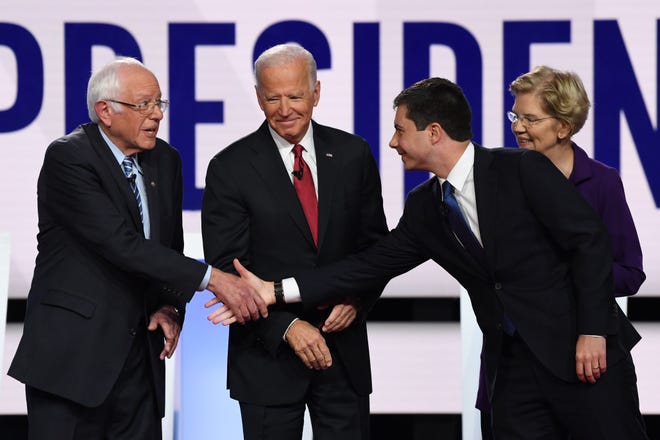Today’s Suffolk University/USA TODAY poll underscores the massive impact that third-party candidates could have on the 2020 general election, offering a statistical signal of concern to the Democratic Party. Former Vice President Joe Biden performs the strongest among the Democrats in a general-election matchup with Donald Trump. However, even as the strongest choice, Biden (41 percent) trails Trump (44 percent) when additional candidates are factored in, with 11 percent saying they would vote for a third-party contender and 4 percent undecided. While Biden receives 80 percent general-election support from Democratic primary voters and caucus-goers, the remaining 20 percent say they would vote either for a third- party candidate or President Trump, or they remain undecided. Going into the 2020 election year, Trump’s nationwide popularity is yet again upside-down. According to the poll, 52 percent view him unfavorably, and 44 percent view him favorably. It would be a mistake, however, to conclude that 2020 will be a cakewalk for the Democratic nominee. Perceptions about Trump were similar in 2016, yet Hillary Clinton lost swing states where a majority of voters said they disliked Trump. Voters rate Trump’s job performance as president better that they rate him, with 50 percent disapproving of the job he is doing and 48 percent approving. The fact that the economy remains the number-one issue this election also positions Trump well. Among voters for whom the economy is the most important issue, Trump’s popularity jumps to 51 percent and his job approval rises to 55 percent. The biggest challenge for the Democratic Party this year will be transferring the support of Democratic voters—who have spread their support across different primary front-runners—to the eventual Democratic nominee. We calculated this “transferability” for Biden, Sanders, Warren, Buttigieg, and Bloomberg supporters using data buried deep in the Suffolk University/USA TODAY poll crosstabs. We analyzed only those voters who were unfavorable to Donald Trump and are voting for one of the top five Democratic candidates to see how much loyalty would be transferred to another Democratic candidate. The results were startling and help to explain not only why Hillary Clinton lost in 2016, but also how important it is for Democrats to nominate a candidate who can minimize Democratic defections to third-party candidates, to Trump, or away from the ballot box entirely. Unfavorable to Trump PERCENT VOTING IN GENERAL ELECTION AND Voting for… FOR EVENTUAL DEMOCRATIC NOMINEE JB BS EW PB MB …BIDEN 100% 79% 79% 74% 74% …SANDERS 84% 100% 86% 74% 70% …WARREN 84% 86% 100% 76% 73% …BUTTIGIEG 89% 84% 85% 100% 80% …BLOOMBERG 88% 79% 82% 80% 100% Among voters favoring the top five Democratic candidates, less than 90 percent would support any of the other four front-runners if they became the Democratic nominee. This finding holds even among those who also stated outright that they dislike President Trump. Scrutinizing specific cross-candidate voter transferability rates reveals a more critical situation for the Democratic Party. There is a “Biden or Bust” scenario in play where less than 80 percent of general election Biden voters who dislike Trump would transfer to Sanders, Warren, Buttigieg, or Bloomberg. Among Sanders supporters who dislike President Trump, 74 percent would vote for Buttigieg were he the Democratic nominee, and 70 percent would vote for Bloomberg if he were the nominee. In the nominee Buttigieg scenario, 17 percent of Sanders voters—despite disliking Trump—would vote third party. With nominee Bloomberg, 19 percent of Sanders voters would vote against the Democratic nominee by voting third party. The poll finds a similar trend among Warren voters who dislike Trump when faced with a more moderate Buttigieg or Bloomberg nomination. The analysis shows that among supporters of the top five candidates, Buttigieg voters are the most loyal to the Democratic Party and would support other potential nominees, whether they are moderate or not. The data from the Suffolk University/USA TODAY poll shows that a different dynamic is emerging—party loyalty has been replaced to a degree by candidate loyalty. That’s the binary choice that is being made by voters in the 2020 election. David Paleologos is director of the Suffolk University Political Research Center.
Paleologos on the Poll: Could a 3rd party candidate determine the election? Maybe























